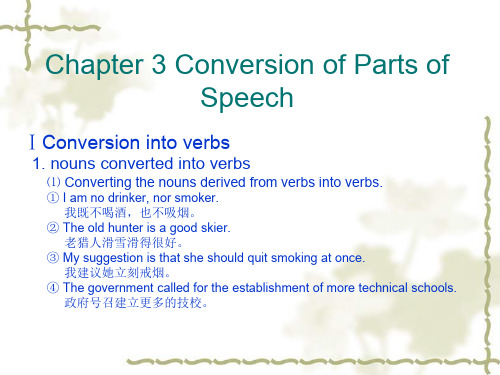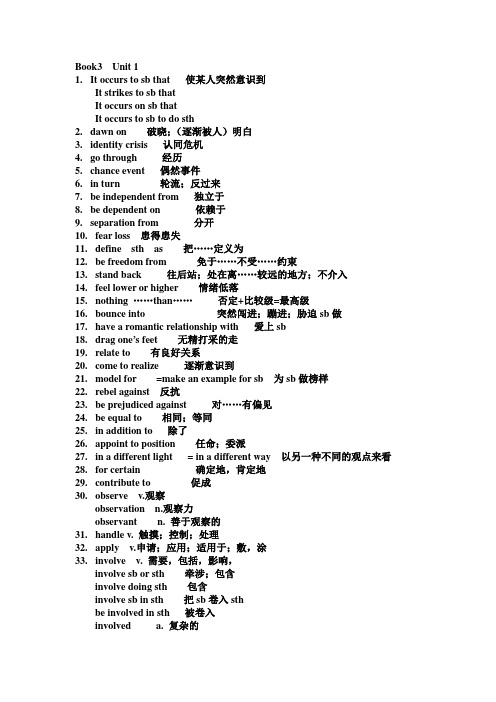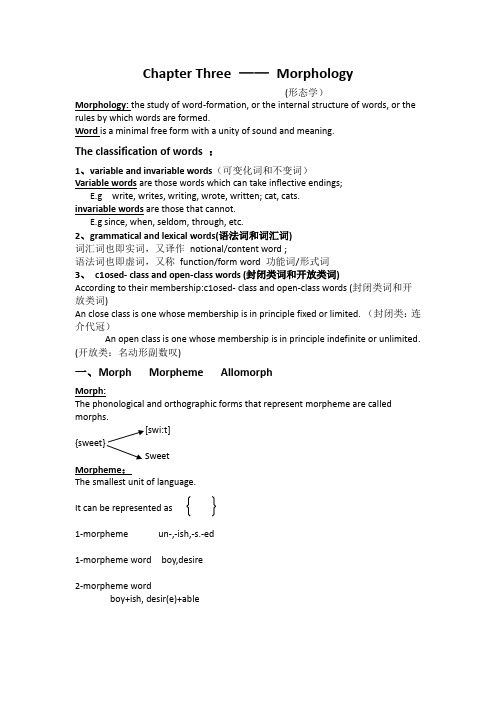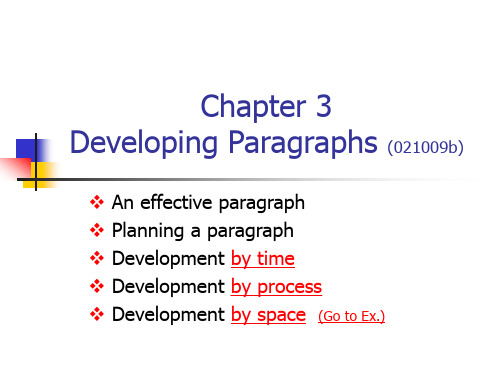chapter 3(1) 词语的翻译
牛津Chapter3

10
1). How was the square by midnight ? It was empty except for the giant horse. 2).How many soldiers were hidden in the horse ? Six soldiers were hidden in the horse. 3). How long did they wait in the horse? They waited in the horse for another hour. 4).How did they open the secret door inside the horse ? They opened it quietly 5).What did they do then ?
F. take control by force
G. past, on the far side of
H. a large group of soldiers
3
Shall we go on?
9.main 10.plain 11.securely 12.seized I.made of wood J.achieved K.an open, four-sided area in a city L.took hold of roughly M.safely N.a wide, level area of land
Chapter Three The night of the horse
1. 竞争 2.故事 3.楼梯 4.消失 5.平原 6.特洛伊 7.向下看 petition 2.tale 3.stair 4.disappear 5.plain 6. Troy 11.木质的 12.车轮 13.打岔 14.服从 15.命令 16.特洛伊人
英汉互译Chapter-3-Conversion-of-Parts-of-Speech

e.g. ① I respect their views, but I deeply believe in the correctness of my decision.
我尊重他们的看法,但我相信我的决定是正确的. ② We found difficulty in solving this problem.
② 那家伙笨得出奇。
That fellow is a typical fool.
③你说他傻不傻?
Don’t you think he is an idiot?
3. Pronouns converted into nouns
e.g. : ① Radio waves are similar to light waves except that their wave length is much greater.
我们发现解决这个问题是困难的. ③ I’m not a stranger in the city, you cannot cheat me. 我对这个城市不陌生,你骗不了我.
④ There is a limit to one’s youth, but no limit to his wisdom. 青春是有限的,但智慧是无穷的。
eg: ① Naughty children cannot always be punished. 调皮的孩子不应该总受到惩罚。
② Mary maybe being interviewed at this very moment, you should not knock at the door.
③ The life of the unemployed is very hard.
现代大学英语精读3 Unit 1 课文 翻译及课文知识重点

Book3 Unit 11.It occurs to sb that 使某人突然意识到It strikes to sb thatIt occurs on sb thatIt occurs to sb to do sth2.dawn on 破晓;(逐渐被人)明白3.identity crisis 认同危机4.go through 经历5.chance event 偶然事件6.in turn 轮流;反过来7.be independent from 独立于8.be dependent on 依赖于9.separation from 分开10.fear loss 患得患失11.define sth as 把……定义为12.be freedom from 免于……不受……约束13.stand back 往后站;处在离……较远的地方;不介入14.feel lower or higher 情绪低落15.nothing ……than……否定+比较级=最高级16.bounce into 突然闯进;蹦进;胁迫sb做17.have a romantic relationship with 爱上sb18.drag one’s feet 无精打采的走19.relate to 有良好关系e to realize 逐渐意识到21.model for =make an example for sb 为sb做榜样22.rebel against 反抗23.be prejudiced against 对……有偏见24.be equal to 相同;等同25.in addition to 除了26.appoint to position 任命;委派27.in a different light = in a different way 以另一种不同的观点来看28.for certain 确定地,肯定地29.contribute to 促成30.observe v.观察observation n.观察力observant n. 善于观察的31.handle v. 触摸;控制;处理32.apply v.申请;应用;适用于;敷,涂33.involve v. 需要,包括,影响,involve sb or sth 牵涉;包含involve doing sth 包含involve sb in sth 把sb卷入sthbe involved in sth 被卷入involved a. 复杂的involvement n. 牵扯;财政困难34.border issue n. 边境问题35.settle dispute 解决争端36.transport gas from sth 传输气体37.see to it 处理;照顾38.critical condition 危险期39.leave it aside 搁置;不考虑leave sb/sth behind 未能/忘记带…leave off 停止leave sth. off 不再穿某物leave it out 忽略;不提及leave sth over 推迟某事40.look at = look into 调查look up 仰视;改善look sth up 查阅(字典,参考书中)look sb up 看望或接触sblook ahead 计划未来look down upon 瞧不起look upon …as 把……视为41.set to 开始精力充沛的做sthset about doing 开始做sthset out to do 开始做sthset out sth 陈述sth42.sent out 派遣43.be content with 知足的44.be free from 摆脱45.interact with 与……相互作用Translation1.她打算申请那个学术工作。
新思维朗文3B chapter3(1)

朗文3B Chapter3(1) Campingi.Words and phrases1.stay in a tent呆在家stay _________ _________呆在学校________ ________ _________2.cook a meal做午饭________ ________煮面条________ ________3.play hide-and-seek踢足球________ ________玩球________ ________4.boil water5.pick up rubbish捡起这本书pick up ________ ________捡起它pick ________ up捡起他们_____________________6.wash outside7.plant trees种花plant _________8.make a fire with banana leaves一片香蕉叶a banana _________生火________________________9.find more firewoodfind a book ________________look for a book __________________10.help to prepare lunch帮忙找盘子help _________ _________ ________ plates11.cook the noodles12.open the tin of pork一听 a _________ _______两听可乐two _________ _________ cola13.take out14.a strong winda heavy rain15.blow away16.taste yummy尝起来很好taste _________ii.Sentences1.Was camp fun? Yes, it was.2.We stayed in a tent.3.What did you do? We cooked a meal.4.There’s not enough firewood for tonight.5.What a lot of firewood!6.Judy and Dad bring a lot of firewood back to the camp.iii.Grammar1.Be动词过去式is-was are-were句型转换:肯定句:It was great fun.There were many books yesterday.否定句:It _________ great fun.There ________ many books yesterday.一般疑问句:_________ it great fun?________ there many books yesterday?练习:①It was rained yesterday.________________________________________________________②We were happy last summer holiday.________________________________________________________2.实义动词过去式stay-stayed cook-cooked句型转换:We cooked a meal.否定(借助助动词did+not,原来动词要还原)We cooked a meal. →We didn’t cook a meal.He stayed at home last Sunday. →一般疑问句(借助助动词did提前,原来动词还原)We cooked a meal. →Did you cook a meal? Yes, we did. No, we didn’t. He stayed at home last Sunday. →练习:①I looked for my books yesterday. (改为否定句和一般疑问句)________________________________________________________________________________________________________________②He started reading when he was five. (改为一般疑问句并作否定回答)________________________________________________________③Mr Green stopped talking just now. (对画线部分提问)________________________________________________________3.感叹句What +How +There are a lot of firewood.→What a lot of fire wood!The dog is very cute.→What a cute dog!→How cute the dog is!练习:She is a beautiful girl. (改为感叹句)____________________________________________________________4.with①和play with friends②用make a fire with banana leaves5.bring sb. sth = bring sth to sb./sp.Dad brings some firewood to the camp. =My mum brings me some presents. =这样句型结构还有:6.顺序词First Next Then Finally7.windwind 风(不可数)a strong wind 一阵大风rain 雨水(不可数)a heavy rain 一场大雨8.What shall we do now?shall为情态动词+ 动词原形Shall we go?Shall I use your pen?Shall用于第一人称9.taste +形容词(尝起来…)look +形容词(看起来)The food taste good.Your friend looks nice.Exercise1.What did you do? We __________(look) for our books.2.I __________(cook) fish yesterday.3.He __________(be) short ten years old.4.We __________(plant) trees on the 21st of January.5.Please __________(pick) up rubbish.6.__________ you happy last winter holiday? Yes, I __________.7.Beeno __________(be) little when he __________(be) a child.8.What __________ he __________(play) with last night?He __________(play) with his toys.9.I cooked the noodles and the vegetables. (改为否定句和一般疑问句)________________________________________________________________________________________________________________________10.Mum only open the tin of pork. (对画线部分提问)____________________________________________________________11.Where did you collected it? (改错)____________________________________________________________12.Judy bring a lot of firewood back to the camp. (改错)____________________________________________________________13.Mark played with Cindy. (对画线部分提问)____________________________________________________________14.完形填空I am Nancy Black. I___1__a brother, Mike. My father is a doctor and my mother is a bus driver. They don't ___2____ on Saturdays and Sundays. They sweep the floor _____3___ Saturday morning. ___4_____ Mike and I like ____5__ some magazines. Sometimes we watch TV, but my father ___6_____, he ___7__ reading a newspaper__8___my mother.( )1. A. am B. have C. has( )2. A. sleep B. work C. like( )3. A. in B. under C. on( )4. A. and B. so C. But( )5. A. reading B. looking C. buy( )6. A. don't B.doesn't C. isn't( )7. A. is B. like C. likes( )8. A. with B. and C. /。
语言学复习重点Chapter 3

Chapter Three ——Morphology(形态学)Morphology: the study of word-formation, or the internal structure of words, or the rules by which words are formed.Word is a minimal free form with a unity of sound and meaning.The classification of words :1、variableand invariable words(可变化词和不变词)Variable words are those words which can take inflective endings;E.g write, writes, writing, wrote, written; cat, cats.invariable words are those that cannot.E.g since, when, seldom, through, etc.2、grammatical and lexical words(语法词和词汇词)词汇词也即实词,又译作notional/content word ;语法词也即虚词,又称function/form word 功能词/形式词3、c1osed- class and open-class words (封闭类词和开放类词)According to their membership:c1osed- class and open-class words (封闭类词和开放类词)An close class is one whose membership is in principle fixed or limited. (封闭类:连介代冠)An open class is one whose membership is in principle indefinite or unlimited. (开放类:名动形副数叹)一、Morph Morpheme AllomorphMorph:The phonological and orthographic forms that represent morpheme are called morphs.[swi:t]{sweet}SweetMorpheme:The smallest unit of language.It can be represented as1-morpheme un-,-ish,-s.-ed1-morpheme word boy,desire2-morpheme wordboy+ish, desir(e)+ableAllomorphA morpheme may be represented by different forms, called allomorphs.im possible{in} in convenientir regular tax.il logical-s [-s] book books{plural} -es [-iz] box boxes-i [-ai] mouse miceConclusion:All the allomorphs should have the same meaning.All the allomorphs should be in complementary distribution.The allomorphs with the same meaning should function the same in the language grammar structure.二、Classification of morpheme1、Free vs. Bound morphemesFree morphemes: those that may constitute words by themselves,e.g. boy, girl, table, nation.Bound morphemes: those that cannot occur alone,e.g. -s, -ed, dis-, un-.Root: the base form of a word that cannot be further analyzed without total loss of identity, i.e. it is that part of the word left when all the affixes are removed.e.g. Dislike, impolite, production,Membership, carelessnessfriend as in unfriendliness.Root may befree: those that can stand by themselves,e.g. black+board; nation+-al; orbound: those that cannot stand by themselves,e.g. -ceive in receive, perceive, conceive.Affix: the type of formative that can be used only when added to another morpheme. Normally divided intoprefix (dis-, un-) andsuffix (-en, -ify).Base: a morpheme to which an affix is added,e.g.friend root > basefriendly root/base + suffix > baseunfriendly prefix + base > baseStem: a morpheme or combination of morphemes to which an inflectional affix may be added,e.g. friend+-s;friendship swrite+-ing,possibility+-es.Note:A stem can be equivalent to a root.A stem may contain a root and aderivational affix.2、Derivational vs Inflectional morphemeInflection indicates:case and number of nouns,tense and aspect of verbs,degree of adjectives or adverbs.Derivation: combination of a base and an affix to form a new word, e.g. friend+-ly > friendly.三、Word-formationCompoundingAffixationOther formation1、CompoundingTwo or more free roots combine to make a new word.✧Noun compounds: daybreak, playboy, haircut, windmill✧Verb compounds: brainstorm, lipread, babysit✧Adjective compounds: gray-haired, insect-eating, dutyfree✧Preposition compounds: into, throughoutEndocentric& exocentricEndocentric: one element serves as the head, the relationship of “a kind of”; e.g. self-control: a kind of controlarmchair: a kind of chairExocentric: there is no head, so not a relationship of “a kind of something”, e.g. scarecrow: not a kind of crowbreakneck: not a kind of neckWritten forms of compoundsSolid: blackboard, teapot, bodyguardHyphenated: wedding-ring, wave-lengthOpen: coffee table, washing machineFree variation:businessman, business-man, business manwinebottle, wine-bottle, wine bottleno one, no-one, noone2、Affixation✧Nominal forms: boys, boy’s✧Verb forms: wants, wanted, wanting✧Adjective/adverb forms: smaller, smallest3、DerivationClass-changing:✧N>V: lengthen, hospitalize, discard✧N>A: friendly, delightful, speechless✧V>N: worker, employee, inhabitant✧V>A: acceptable, adorable✧A>N: rapidness, rapidity✧A>V: deafen, sweeten✧Adj>Adv: exactly, quickly4、Other formations:1)Blendingtransfer+resistor>transistorsmoke+fog>smog2)Acronym①AIDS, Aids: Acquired Immune Deficiency Syndrome②ASAP: as soon as possible3)Abbreviation/InitialismAI: artificial intelligencea.s.a.p.: as soon as possibleECU: European Currency Unit4)ClippingBack-clippings: ad(vertisement), chimp(anzee), deli(catessen), exam(ination), hippo(potamus), lab(oratory), piano(forte), reg(ulation)sFore-clippings: (ham)burger, (omni)bus, (violin)cello, (heli)copter, (alli)gator, (tele)phone, (earth)quakeFore-and-aft clippings: (de)tec(tive)5)Back-formationdiagnose < diagnosisenthuse < enthusiasmlaze < lazy6)Invention/CoinageMostly brand names:Kodak, Coke, nylon, Band-aid, Xerox, LycraCoca-cola, Orlon and Dacron7)BorrowingFrench: administration, parliament, public, court, crime, judge, army, enemy, Greek: catastrophe, cosmos, criterion, idiosyncrasySpanish and Portuguese: banana, barbecue, cafeteria, cargo, chocolate,8)Conversion 转换e.g. to butter the bread, take a look, empty a box, up the price9)Eponymsare words that originate from proper names of individuals or places.e.g. Sandwich (originating from the fourth Earl of Sandwich, who put his food between two slices of bread so that he could eat while gambling)ExerciseI. Decide whether each of the following statements is true or false.1. A morpheme must convey a lexical meaning.2. All words can be said to contain a root morpheme.3. Free morphemes can be further classified into inflectional and derivational morphemes.4. All words have morphs but not necessarily allomorphs.5. The word “modernizations”is made up of three morphemes.6. Derivational morphemes never change the class of the words to which they are attached.II. Fill in each of the following blanks with a proper word.Morphology is a branch of grammar which studies the ___ ___ of words and the____ by which words are formed.[-t], [-d], and [-id] are ___of the morpheme –ed.“Careless”is the __ of the word “carelessness”.__ affixes,__affixes, and __roots are all bound morphemes.III. Questions1. Analyze and then tell how many morphemes each of the following words contain. unselfishness, justifiable, sporting2. What constitutes the internal structure of words?3. List the allomorphs of the morpheme plural.。
大学英语第三册UNIT3全文翻译对照

The land of the lock1. Years ago in American, it was customary for families to leave their doors unlocked, day and night. In this essay, Greene regrets that people can no longer trust each other and have to resort to elaborate security system to protect themselves and their valuables.Although the author is writing his opinion, he uses many examples to reinforce his ideas and to prove his thesis.几年前在美国,许多美国家庭的门通常都是日夜不上锁的。
在本文中,格林遗憾地指出人们已经不再彼此信任,不得不求助于各种复杂的安全设备来保护自身及其贵重物品。
作者在提出自己观点的同时,举出了大量的事例来证实和强调自己的观点;2. In the house where i grow up, it was our custom to leave the front door on the latch at night. I don't know if that was a local term or if is universal;"on the latch"meant the door was closed but not locked . None of us carried keys the last one in for the evening would close up,and that was it. 在我长大成人的家里,我们的习惯是晚上把前门闩上。
英语写作基础教程(chapter 3)01

and arranges his history books accordingly. It is odd,
but it is convenient. #
.
Assignments
Reading:
pp 41-45
Exercises:
pp 49-54 ▪ Exercise 1: Chronological order ▪ Exercise 2: Process ▪ Exercise 3: Space
(ways of developing paragraphs)
Development by Time
In telling a story or recounting an event, the easiest and clearest way is to describe things in order of time; earlier things are mentioned before later things, the first thing first and the last thing last. This method is also called chronological sequencing.
An effective paragraph
❖ 3 features of an effective paragraph: 1. A paragraph should have one, and only
one, central idea. 2. The main idea is generally expressed in
Example:
In the old days, train travel was not much fun. Back in the 1830’s, passenger coaches on western and southern roads looked like cabins on wheels. Until late in the 1840’s, passengers who wanted heat bought heated bricks from boys at the stations. There were no sleeping cars, either, until 1859, when George R. Pullman remodeled two day coaches into sleeping cars, to run from Chicago to Bloomington, Illinois. They were lighted by candles and heated by wood-burning stoves. Passengers near the stoves were too hot, and those far away were too cold. Even years later, after trains had better heating systems, passengers were often most uncomfortable. Open windows let in showers of soot and cinders; and closed windows meant stifling temperatures. Travelers reached their destinations in those days sooty, jostled, and travel-worn. #
了不起的盖茨比第三章中英翻译The Great Gatsby Chapter 3

Chapter 3THERE was music from my neighbor's house through the summer nights. In his blue gardens men and girls came and went like moths among the whisperings and the champagne and the stars. At high tide in the afternoon I watched his guests diving from the tower of his raft, or taking the sun on the hot sand of his beach while his two motor−boats slit the waters of the Sound, drawing aquaplanes over cataracts of foam. On week−ends his Rolls−Royce became an omnibus, bearing parties to and from the city between nine in the morning and long past midnight, while his station wagon scampered like a brisk yellow bug to meet all trains. And on Mondays eight servants, including an extra gardener, toiled all day with mops and scrubbing−brushes and hammers and garden−shears, repairing the ravages of the night before.Every Friday five crates of oranges and lemons arrived from a fruitier in New York every Monday these same oranges and lemons left his back door in a pyramid of pulp less halves. There was a machine in the kitchen which could extract the juice of two hundred oranges in half an hour if a little button was pressed two hundred times by a butler's thumb.At least once a fortnight a corps of caterers came down with several hundred feet of canvas and enough colored lights to make a Christmas tree of Gatsby's enormous garden. On buffet tables, garnished with glistening hors−d'oeuvre, spiced baked hams crowded against salads of harlequin designs and pastry pigs and turkeys bewitched to a dark gold. In the main hall a bar with a real brass rail was set up, and stocked with gins and liquors and with cordials so long forgotten that most of his female guests were too young to know one from another.总是有悠扬的音乐在夏夜的晚上从我隔壁传出。
- 1、下载文档前请自行甄别文档内容的完整性,平台不提供额外的编辑、内容补充、找答案等附加服务。
- 2、"仅部分预览"的文档,不可在线预览部分如存在完整性等问题,可反馈申请退款(可完整预览的文档不适用该条件!)。
- 3、如文档侵犯您的权益,请联系客服反馈,我们会尽快为您处理(人工客服工作时间:9:00-18:30)。
As a demanding boss, he excepted total loyalty and dedication from his employees. 他是个苛刻的老板,要求手下的人对他忠心耿耿,鞠躬 尽瘁。(贬) Those who do not remember the past are condemned to relive it. 凡是忘掉过去的人注定要重蹈覆辙。(贬)
1
[1][2][3][4][5]
Methods
• Based on the speech of the word • Based on the context and the logical relations • Based on the commendatory term or derogatory term • collocation
3
第三章 词语的翻译——词义的选择
[<]
但在下面例句中,like又分属其他几个不同词类: 1) He likes mathematics more than physics. 他喜欢数学甚于喜欢物理学。(动词) 2) In the sunbeam passing through the window there are fine grains of dust shining like gold. 在射入窗内的阳光里,细微的尘埃象金子一般在闪闪发光。
(前置词)
3) Like knows like.
英雄识英雄。(名词)
4
[1][2][3][4][5]
Based on the speech of the word
Your account of what happened is not quite right. 你对于发生的事情的叙述不太正确。 Go right on until you reach the church. 一直往前走,直到你到达教堂为止。 It’s my right of way, so that lorry must stop or slow down until I’ve passed it. 我有优先通行权。 She tried her best to right her husband from the charge of robbery. 她尽力为她丈夫被控抢劫一案伸冤。
• It was a good paper. • 这是一家声誉很高的报纸。
14
• “Proper words in proper place make the true definition of style.” • 合适的词用在合适的地方就是好文章。 • ——Jonathan Swift
15
• We have been working all day. We must have a break. • 我们干了一整天了,必须休息一下。
• The cheques are all good, of course. • 当然,这些支票是完全有效的。
13
• Each time he gave the bartender a good tip. • 每次他都给酒保优厚的小费。 • I do not speak without good evidence. • 我不会说没有可靠根据的话。
• Tom must be a good football player. • 汤姆一定是个优秀的足球队员。
12
• I can’t find good words for it. • 我找不到合适的语言来表达。 • It was a good morning; there were high white clouds above the mountain. • 这是一个明媚的早晨,群山上高高地飘着白云。
2
3.1.1 根据词在句中的词类来选择 和确定词义(Based on the speech of the word)
选择某个词的词义,首先要判明这个词在 原句中应属哪一种词类,然后再进一步确 定其词义。例如: Like charges repel. Unlike charges attract. (同性相斥,异性相吸)
Letter of Recommendation
Certificate An Oral Message
Resume Schedule
8
第三章 词语的翻译——词义的选择
[<]
3.1.2. 根据上下文联系以及词在句子中的搭配关系来选择 和 确 定 词 义 ( Based on the context and the
3)took the brake off, took 20 percent off. 松开刹车 优惠百分之二十
10
[1][2][3][4][5]
• He halted in the district where by night are found the lightest street, hearts, vows and librettos. • 在一个市区停下脚步,那里晚上有最明亮的街道, 最愉快的心情,最轻率的盟誓和最轻松的歌曲。
• 路上浮尘早已刮净,剩下一条洁白的大道 来,车夫也跑得更快。 • By now the loose dust had all been blown away, leaving the roadway clean and the rickshaw man quickened his pace. (鲁迅 《一件小事》,杨宪益、戴乃迭译)
logical relations)
英语中同一个词,同一词类,在不同场合往往也有不同 的含义,必须根据上下文的联系以及词的搭配关系或句型来 判 断 和 确定 某 个 词在 特 定 场合 下 所 应具 有 的 词义 。 例 如 “Last”这一形容词: “Each word when used in a new context is 1) He is the last man to come. a new 他是最后来的。(Being, coming, or placed after all others; final) word.” ——J.R. Firth 2) He is the last man to do it. 他绝对不会干那件事。 (Least likely or expected) 3) He is the last person for such a job. 他最不配干这个工作。(The least desirable or suitable)
21
Examples (1)
• • • • • • • • That beat me. 真把我难住了。 We can beat him. 我们可以打败他。
He was cursing to beat the band. 他骂了个痛快淋漓。
22
Examples (2)
• These constant changes in the weather beat me. • 这儿变化无常的天气使我适应不了。 • • He can beat me in mathmatics. • 他的数学比我高明千万倍。 • • It beats me how he did it. • 我不懂他怎么干出这种事来。
16
3.1.3 Based on the commendatory term or derogatory term • 任何语言都有语体之分,有文雅、通俗、粗野; 还有俚语、公文语以及术语等。文学作品中,作 家通过不同的语体来刻划任务性格特征。翻译时, 必须审其雅俗,量其轻重,这样才能恰如其分地 表达原文的精神。翻译时有五要素:节奏的缓急, 态度的褒贬,感情的浓淡,语气的轻重和用语的 雅俗。 • Examples
9
[1][2][3][4][5]
第三章 词语的翻译——词义的选择
[<]
再如“take (off)这一动词: 1) To take off her boots or to put them on was an agony to her, but it had been an agony for years. 脱鞋或穿鞋对她是一种痛苦,但这已经是多年以来的 痛苦了。 2) The flyers practiced taking off time after time from this restricted space. 飞行 人员反复地在一块有限空地上练习起飞。
5
• I said sorry, but he didn’t say a word. He just gave me a black look. • 我说了对不起,但他没吭声,只是白了我 一眼。 • 只是面带愠色地瞪了我一眼。 • The growing black economy is beginning to worry the government. • 政府已经开始担忧日益增长的“黑色经 济”*。 • *译注:“黑色经济”指国家经济中隐藏的 私人现金交易的部分。 6
18
根据上下文确定词义的褒贬(2)
• The enemy killed one of our comrades and we killed an enemy agent. • 敌人杀了我们一个同志,我们宰了一个敌特。
• An aggressive country is always ready to start a war. • 一个好侵略的国家总是准备挑起战争。 • An aggressive young man can go far in this firm. • 一个富有进取心的年轻人在这家公司前途无量。
7
第三章 词语的翻译——词义的选择
[<]
4). XX启事: XX信 ① 招领启事 Found 推荐信 ② 鸣谢启事 Acknowledgements 证明信 ③ 征稿启事 Contributions Wanted 口 信 ④ 更正启事 Corrections XX表 ① 病历表 Case History Form 履历表 ② 时间表 Timetable 日程表
